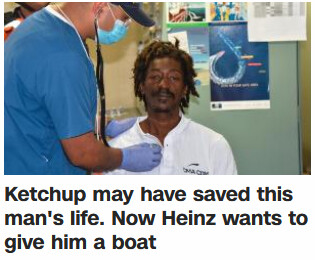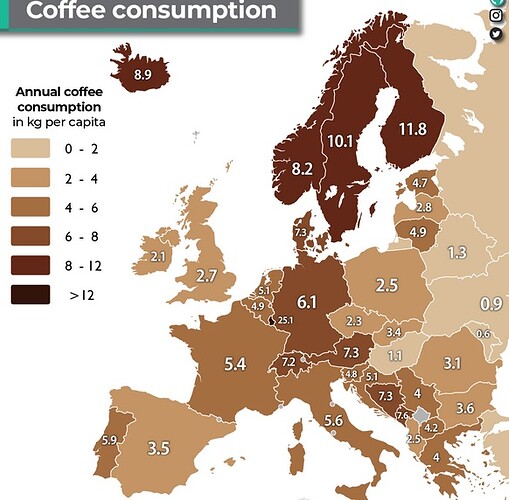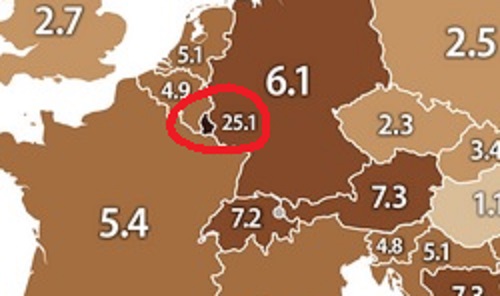Running a humidifier should help, I’m surprised it gets that dry during the winter in Seattle.
JCO continues to go hard
https://twitter.com/joycecaroloates/status/1628895935831891969?s=46&t=_1gXvnGtH8oIzZP_T2dFNQ
Orignal Famous Ray’s, or Famous Original Ray’s?
How is consumption defined?
Maybe they have cheap taxes there and the Belgians, Germans, and French who live close to the border are buying a bunch of their coffee in Luxembourg?
- Small countries tend to be outliers.
- Luxenberg is also the wealthiest country (per capita) in europe by a large margin.
Maybe Luxembourg got so wealthy by making coffee at home.
60% of people who work in Luxembourg live outside the country and commute in, so consumption rates of anything consumed at work are going to be artificially high per-capita of residents.
footnotes. how do they work.
Yay one more thing to stress about. Although my befriending strangers in bars days are mostly over.
Lower taxes means more people travel to Luxembourg to buy things like coffee, alcohol, and cigarettes which artifically raises the per capita number of all of those products.
Don’t think this is true at all, sales tax in Luxembourg is 17% and I have a hard time believing people cross the border to buy coffee anyway, it’s not like it costs much. I think it’s what I posted upthread, that a lot of people commute into Luxembourg for work and then drink coffee, meaning the per resident consumption rate appears very high.
https://www.reddit.com/r/Luxembourg/comments/10rpr7z/coffee_consumption_per_capita/
From a post there
So we’re kinda both wrong and kinda right. I guess you’d be more right given the commuting workers thing.
Surprised at how little coffee is consumed in Warsaw Pact states. Most people I know have at least a cup or two of coffee per day.
I don’t know anything about Luxembourg but i dig the idea that it’s the place where Germans cross the border for cigarettes and fireworks.
Sort of like Europes Gary Indiana
From CNN’s front page is the most confusing headline I’ve seen in a while:

And I am intentionally not looking to fill in the details, because the stories I’m imagining are much more fun.
I’m just going to tell you, his name is Elvis.
IMO he was lost on a desert island, then a pallet of Heinz ketchup washed ashore. He survived on the ketchup’s nutrients and then used the empty containers to make a raft on which he sailed to freedom.
In which Jude Ellison S Doyle coins the name monicker Joyce Carol GOATs.
Joyce Carol Oates has, famously, one of the worst accounts on Twitter. It’s bad partly because of the wildly ill-advised things she posts, all of which go viral — previous JCO hits include: Halloween skeleton decorations are disrespectful to dead people; the dinosaurs from Jurassic Park are real and endangered by big game hunters; her feet — and partly because, well, it’s her. She’s one of the most respected and prolific novelists of the 20th century, and now an entire generation knows her as “the gross Twitter feet lady.”
Ladies and gentlemen, allow me to introduce her by another name: Joyce Carol Oates, model of respectful allyship and personal growth.
It’s not just that Joyce Carol Oates is suddenly posting a whole bunch of rad stuff about trans people. It’s that she had a learning curve. She worked on herself. For years. Look, she starts off here:
https://medium.com/@judedoyle/joyce-carol-goats-d04603d465da
After a blistering takedown of Jordan Peterson, Kareem Abdul-Jabaar is still outplaying everyone.
MY TAKE : I’m not a fan of messing with an author’s original text, even when that text might be offensive to modern sensibilities. I would rather that those texts come with some explanation to put it into historical context, as Disney has done with its more problematic older movies. Peter Pan has some very dark moments: Peter proposes murdering a pirate and brags he’s killed “tons.” He also boasts about dismembering others. The Lost Boys get killed and sometimes, if there are too many, Peter “thins them out.” That darkness is part of the power of the story. Though Disney may produce a kinder, gentler movie version, the book remains untouched.
I also take issue with their claim that “any changes were ‘small and carefully considered.’” By small, they mean the number of words changed related to the total number of words in the text. But the examples of changes given in the article are not “small” because they significantly alter the author’s intent. Second, how “carefully considered” the choices were is irrelevant. It’s the act that is being judged, not how long it took you to do it. Casing a business for a long time before burglarizing it doesn’t excuse the crime.
I realize the justification is that the books were written for children and the publishers are pretending they are protecting the children. But Dahl, a notorious racist and antisemite, wrote dark books that were sometimes mean-spirited. Those are reasons to stay away from his books if you seriously wanted to protect children. But the real motivation for these changes is nothing more than money: how can they keep pushing Dahl’s work but for today’s sensibilities. The answer is, you don’t. The work is the work and not for us to change just to scrape up a few more bucks off a famous name.
I fully support producing books that cater to kids’ needs and that reflect our commitment to cultural diversity and sensitivity. If that’s our goal, then let’s support books that do that and not ones that need to be altered. I just don’t want to put words in another author’s mouth without their permission.
Mark Twain’s use of the n-word and racial stereotypes in The Adventures of Huckleberry Finn are offensive by today’s standards, but I still don’t want the book changed. Let’s debate whether it is racist or anti-racist based on what Twain wrote, not change the text into what our current sensibilities want it to say. What art works would be safe once we start editing? A sports bra on Venus de Milo? Board shorts on Michelangelo’s David ? Let’s do justice to our children by explaining works and their context rather than treating art like toilet seat bands that promise “sanitized for your protection.”
Also had good coverage of the NYT’s fucking terrible response to their staff calling them out for publishing fucking terrible trans stories.
MY TAKE : About 1.6 million Americans identify as transgender. So, why all the fuss over such a small segment of society? Because, although the group may be small, the stakes are huge. The first step in marginalizing a group and justifying curbing their rights is to identify them as a small and therefore powerless group outside the mainstream. However, most marginalized groups can be designated as small in relationship to others: Jews, Muslims, Latinx, LGBTQ+, the elderly.
What we need to always be aware of is that how we treat any one marginalized group is how we will treat all of them—given the chance. There is no such thing as ignoring the exploitation of one group hoping they won’t come for you.
I read The New York Times daily, along with many other publications. I trust its integrity based on its history of mostly accurate coverage, despite missteps. However, I don’t have blind faith in any news source. I’m a little shocked that they came out so hard against their own writers. Even if the NYT is technically right in its position (and I’m not saying they are), they look arrogant and childishly stubborn in not even considering the point of view of a lot of very smart and informed people who they pay to be smart and informed.
The letter should have been an opportunity for public self-reflection, meeting with concerned groups, and a presentation of both sides in an atmosphere of co-operation. Instead, we got childish posturing. Would the NYT have acted so adamantly if the letter had been about racist coverage and signed by one thousand civil rights leaders? Their dismissive reaction certainly seems to confirm the letter signatories’ point.
ALSO READ: “NY Times Union Hits Back at Reporters Who Defended Paper’s Trans Coverage” (The Daily Beast)
He was almost hit by a runaway trolly driven by a bottle of ketchup that decided at the last moment to hit an elderly person instead.

